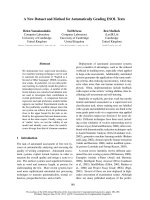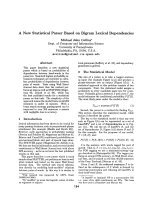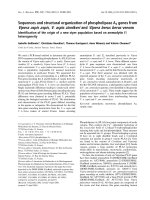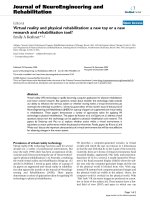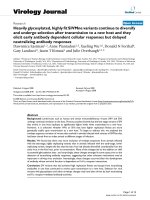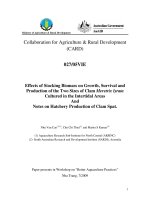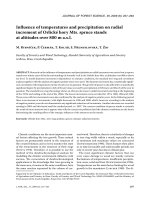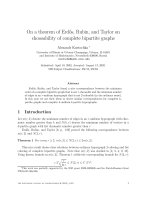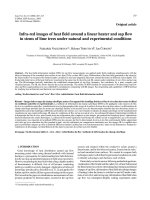Aristolochia mulunensis aristolochiaceae a new record and notes on taxonomy distribution of some aristolochia species for the flora of vietnam
Bạn đang xem bản rút gọn của tài liệu. Xem và tải ngay bản đầy đủ của tài liệu tại đây (715.24 KB, 7 trang )
VNU Journal of Science: Natural Sciences and Technology, Vol. 35, No. 2 (2019) 58-64
Original Article
Aristolochia mulunensis (Aristolochiaceae), a New Record
and Notes on Taxonomy, Distribution of some Aristolochia
Species for the Flora of Vietnam
Lai Viet Hung1,2, Nguyen Trung Thanh2, Do Van Truong3,*
1
National Institute of Medicinal Materials, No. 3B Quang Trung, Hoan Kiem, Hanoi, Vietnam
Faculty of Biology, VNU University of Science, 334 Nguyen Trai, Thanh Xuan, Hanoi, Vietnam
3
Department of Biology, Vietnam National Museum of Nature, Vietnam Academy of Science &Technology,
18 Hoang Quoc Viet, Cau Giay, Hanoi, Vietnam
2
Received 14 January 2019
Revised 11 March 2019; Accepted 14 March 2019
Abstract: Aristolochia mulunensis Y.S. Huang & Yan Liu, an endemic species to Guangxi, China,
is newly recorded for the flora of Vietnam. The article discusses the taxonomy and distribution of
some Aristolochia species in Vietnam, namely A. petelotii, A. balansae, A. xuanlienensis, A.
quangbinhensis, and A.tadungensisare. Additionally, the morphological features of the capsule and
seeds of A. petelotii and A. balansae are described for the first time.
Keywords: Aristolochia, Aristolochia mulunensis, distribution, new record, Vietnam.
1. Introduction
subgenus Aristolochia (Do & Nghiem 2017,
Pham et al. 2018) [2, 3].
While conducting a taxonomic revision of
Aristolochia for the flora of Vietnam, we
found out a set of specimens at NIMM
herbarium, collected in Ha Giang province,
probably misidentified to Aristolochia
shukangii Chun et How (nom. nud. in herb.)
that was later synonymized to A. kwangsiensis
W.Y. Chun & F.C. How ex C.F. Liang (Hwang
Aristolochia L., the largest genus of
Aristolochiaceae
family,
comprises
approximately
500
species
distributed
throughout in the tropical and subtropical
regions (Wagner et al. 2012) [1]. Currently, 24
Aristolochia species belonging to two subgenera
are known from Vietnam, of which seventeen
are in subgenus Siphisia and seven are in
________
Corresponding author.
Email address:
/>
58
L.V. Hung et al. / VNU Journal of Science: Natural Sciences and Technology, Vol. 35, No. 2 (2019) 58-64
et al. 2003) [4]. Detailed re-examination of
these specimens and studies on the protologues
and type specimens of previously known
Aristolochia species revealed that these specimens
completely match with Aristolochia mulunensis
Y.S. Huang & Yan Li, a recently described new
species from Guangxi province, China (Huang et
al. 2013) [5]. Therefore, we here report
Aristolochia mulunensis as a new record for the
flora of Vietnam. The description, illustrations,
taxonomic notes and comparison with the
morphologically similar species are given.
Many Aristolochia species in Vietnam such as
A. balansae, A. petelotii, A. xuanlienensis, A.
quangbinhensis, and A. tadungensis have been still
known only from the type locality (Ho 2000, Ban
2003, Huong et al. 2014, Do et al. 2014, 2015) [610]. However, our recent field investigations
of the diversity of Aristolochia through
National Parks and National Reserves in
Vietnam confirmed new distribution areas of
these species. Furthermore, the capsule and
seeds of A. balansae and A. petelotii have not
yet been seen (Franchet 1898, Schmidt 1935,
Ho 2000, Ban 2003) [6,7,11,12] which are
firstly described here.
2. Materials and methods
Survey of herbarium specimens: During
the preparation of a taxonomic revision of
Aristolochia for Vietnam, approximately 200
specimens were examined from the major
herbaria: CPNP, DR, HN, HNU, IBK, IBSC,
K, KUN, L, MO, NIMM, P, SGN, VNM, and
VNMN.
Field collecting: Observation of living plants
allowed comparison of morphological characters
and coloration of the perianth (utricle, tube, and
limb) which are most important to identify
species within Aristolochia and often impossible
to observe in dried specimens.
Identification: The macromorphological
features were analyzed by using an optical
microscope (Stemi DV4; LEICA S8 AP0) based
on the specimen sheets and notes in the field
59
observations. The morphological characters of
studied specimen were compared with
previously described species on the basis of
protologues and type specimens.
3. Taxonomic treatment
New Aristolochia record to the flora of
Vietnam
Aristolochia mulunensis Y.S. Huang & Yan
Liu, Ann. Bot. Fennici 50: 175 (Figure 1).
Perennial, woody lianas, young branches
climbing. Root stock globose or nearly rounded.
Stem terete in cross section, young branches
densely dusty yellow to brownish hirsute, old
stem with deeply striate bark. Petiole 4-12 cm
long, densely brownish-hirsute. Leaf blade
cordate to orbicular, 9-25 cm long, 12-21 cm
wide; leaf apex obtuse or acute; leaf base cordate
or auriculate, sinus 1.5-2.2 cm deep, 0.6-1 cm
wide; adaxially glabrous, abaxially densely
hirsute; margin entire, brownish-hirsute; basal
veins 3, palmate; secondary veins four pairs,
pinnate; venation reticulate rather sunken on the
adaxial surface and clearly prominent on the
abaxial surface. Inflorescence cymose on young
branches and old woody stems, each 2-4flowered; inflorescence axis 2.2-3.2 cm long,
pendulous, densely brownish-hirsute. Bracteole
subulate, clasping the axis, 3-5 mm long, 1.5-2
mm wide, both surfaces densely brownish
hirsute. Pedicel 1.2-1.5 cm long, curved, densely
hirsute. Ovary oblong, 11-12 mm long, 3-4 mm
in diam., densely hirsute. Perianth horseshoeshaped, purple. Utricle ellipsoid-shaped, 1.1-1.2
cm high, 0.5-0.6 cm in diam. Tube cylindrical,
1.6-1.8 cm high, 0.5-0.6 cm in diam.. Limb
unequal 3-lobed, the lobes valvate in preanthesis, dark-purple and outside densely
hirsute, during anthesis margins of all lobes
expanded, forming a subrotunded-discoid
shaped, usually reflexed, nearly quadrilateral,
2.2-3 cm in diam; outer surface of the limb lobes
purplish, densely brownish-hirsute, inner surface
dark-purple, densely covered protuberance of
the same color, margin slightly revolute.
60
L.V. Hung et al. / VNU Journal of Science: Natural Sciences and Technology, Vol. 35, No. 2 (2019) 58-64
Annulus present with a circular flange, ca. 5-6
mm in diam.. Throat purple with white dots.
Gynostemium 3-lobed, 4-6 mm high, 2.5-3 mm
in diam., white, three lobes with obtuse apices,
smooth. Anthers oblong, 2.5-3.0 mm long,
yellow. Capsule not seen.
Figure 1. Aristolochia mulunensis - A. branch with inflorescence; B. adaxial leaf surface; C. cymose and front
view of open flower. A: herbarium sheet at NIMM; B-C taken by D.V. Truong.
Type: China. Guangxi, Hechi city,
Huanjiang contry, Mulun National Natural
Reserve, alt. 614 m a.s.l., 27 Apr 2012, Yu-Song
Huang et al. ML1425 (holotype IBK!; isotype
IBK!)
Ecology and Phenology: Aristolochia
mulunensis grows on the foothills of forests of
limestone areas. Flowering in April-May.
Distribution and Ecology: Aristolochia
mulunensis was previously reported from
Guangxi province, China. During recent
investigations, we also found this species in
Northern Vietnam (Ha Giang).
Ethnobotany: Aristolochia mulunensis is
used medicinally. The rootstock is used for
treatment of diuretic, nephritis and hepatitis
diseases.
Taxonomic notes: Aristolochia mulunensis is
most similar to Aristolochia kwangsiensis Chun
et How ex Liang by having a cordate to orbicular
L.V. Hung et al. / VNU Journal of Science: Natural Sciences and Technology, Vol. 35, No. 2 (2019) 58-64
leaf blade and densely hirsute on abaxial leaf
surface. However, it clearly differs from the
latter by the following morphological characters
of perianth (purple vs. pale green), inner surface
of limb lobes (densely covered protuberance vs.
densely covered protuberance), and throat
(purple with white dots vs. exclusively yellow).
Additional specimens examined: Vietnam:
Ha Giang prov., Meo Vac distr., Lung Chinh
comm., 29 May 1973, L.M. Xu2048 (NIMM).
New distribution areas
Aristolochia species in Vietnam
of
some
Aristolochia petelotii Schmidt, Repert. Spec.
Now. Regni Veg. 32: 95 (Figure 2A-B).
Type: VIETNAM. Lao Cai. Sa Pa, Ta Phinh
Van, Petelot 4418 (P02028702, holo.!).
Distribution: China (Yunnan) and Vietnam
(Lao Cai, Ha Giang and Cao Bang).
Notes: Schmidt (1933) [12] originally
described and illustrated Aristolochia petelotii
from the flowering specimen Petelot 4418 (P)
collected from Ta Phinh Van community, Sa Pa
district, Lao Cai province, Vietnam. Until now,
it has been known only from the type locality
(Nguyen 2003) [7]. Based on the recent field
investigation, we also found out this species
occurring in Ha Giang and Cao Bang provinces,
Northern
Vietnam.
Additionally,
the
morphological characters of capsule and seeds
are firstly described here based on the fruiting
specimen collected from Ha Giang province
(T.V. Phan et al. TB-10078 (NIMM)). Capsule is
cylindrical, 5.5-6.5 cm long, 2.2-2.5 cm in diam.,
distinctly 6-angled, dark-brown, angles villous,
becoming glabrescent, basipetally dehiscent.
Seeds are ovoid, 6-7 mm long, (3-) 4-5 mm in
diam., non-winged, one surface is convex, and
the another surface is deeply concave, both
surfaces are smooth.
Additional specimens examined: LAO CAI.
Sapa, Ta Phinh Van, Sep 1932, Petelot 4418 (P);
1942, Petelots.n. (VNM); Ban Khoang, 31 Aug
2001, N. Tapet al. 5677 (NIMM); 29 Mar 2003,
N.D. Phuong et al. 7122 (NIMM); Ta Giang
61
Phin, Suoi Thau, 6 Oct 2001, N. Tap & N.D.
Phuong 5672 (NIMM); 29 Mar 2003, N.D.
Phuong & N.T. Huyen 7122 (IMM); 14 Jan
2013, D.V. Truong 22 (VNMN, DR); 17 Apr
2013, D.V. Truong 22 (VNMN, DR). Bat Xat, Y
Ty, Mu Phu Chai, 5 Oct 2001, N. Tap et al. 5670
(NIMM). - HA GIANG. Quan Ba, Thai An, Ba
Tien, 16 Dec 1999, N.D. Phuong & D.V. Son
7476 (NIMM). Bac Me, Phieng Luong, 22 Apr
2015, P.V. Truong et al. TB-10078 (NIMM). CAO BANG. Nguyen Binh, Phia Oac-Phia Den
National Park, 27 Oct 2013, D.V. Truong 65
(VNMN, DR).
Aristolochia balansae Franch, Joirn. de Bot.
12: 311 (Figure 2C-D).
Type: VIETNAM. Hanoi. Ba Vi National
Park, 18 Oct 1887, Balansa 3159 (P00623809,
holo.!, K, iso.).
Distribution: Endemic to VIETNAM (Ha
Noi, Ninh Binh and Thanh Hoa)
Notes: Franchet (1898) [11] originally
described A. balansae from a flowering
specimen only that collected from Ba Vi
mountain, Northern Vietnam. Later, Nguyen
(2003) reported that A. balansae also occurs in
Lao Cai, Hoa Binh, and Vinh Phuc without
specimen cited. However, the recent study and
observation confirmed that the specimens were
collected from Lao Cai, Hoa Binh, and Vinh
Phuc belonging to other species, namely A.
fangchi Y.C. Wu ex L.D. Chow & S.M. Hwang
(Do et al. 2015) [10]. Furthermore, during
recent field investigation, we collected more
the flowering and fruiting specimens of this
species at the type locality and the surrounding
other areas, Pu Luong Nature Reserve, Thanh
Hoa province and Cuc Phuong National Park,
Ninh Binh province. By these observations, the
morphology of capsule of A. balansae is firstly
described here. Capsule is narrowly cylindrical,
brown, 10-12 cm long, 2.0-2.2 cm in diam.,
basipetally dehiscent. Seeds are ovoid, 6-8 mm
long, 4-5 mm in diam., non-winged, one surface
is convex and the another surface is deeply
concave, both surfaces are smooth.
62
L.V. Hung et al. / VNU Journal of Science: Natural Sciences and Technology, Vol. 35, No. 2 (2019) 58-64
Figure 2. Aristolochia petelotii (A. perianth; B. capsule) and A. balansae (C. leaves, perianth and capsule; D.
close up of perianth). A-B taken by P.V. Truong at Phieng Luong, Bac Me, Ha Giang; C-D taken by D.V.
Truong at Pu Luong Nature Reserve, Thanh Hoa.
Additional specimens examined: HANOI.
Ba Vi National Park, Apr 1909, s.n. (P), 14 Oct
2012, V.D. Hungs.n. (VNMN); 6 Jan 2013, D.V.
Truong 01 & 02 (VNMN, DR). - NINH BINH.
Cuc Phuong National Park, 24 Apr 2013, D.V.
Truong 41 (VNMN, DR). - THANH HOA. Pu
Luong Nature Reserve, Oct 2014, D.V. Truong
60 (VNMN).
Aristolochia xuanlienensis Huong N.T.T,
Quang B.H. & Ma J.S., Phytotaxa 188 (4): 176
(Figure 3A-B)
Type: VIETNAM. Thanh Hoa, Xuan Lien
Nature Reserve, 7 Nov 2011, Hai D.V., Quang
B.H., Cuong N.T., Vu D.Q., Thanh B.V., and
Thanh T.X. XL 129 (holotype HN!; isotypes: CSH).
Distribution: Endemic to VIETNAM
(Thanh Hoa and Ninh Binh).
Notes: Huong et al. (2014) [8] originally
described A. xuanlienensis based on the type
specimens collected from Xuan Lien Nature
Reserve, Thuong Xuan district, Thanh Hoa
province. However, the new distribution areas of
this species in Cam Thuy district (Thanh Hoa)
and Hoa Lu district (Ninh Binh) are here
reported based on recent field investigations.
Additional specimens examined: THANH
HOA. Cam Thuy, Cam Thach, Chay village, 25
Mar 1975, N.V. Trai & N. Tap 2300 (NIMM); 7
May 2013, D.V. Truong 34 (VNMN). - NINH
BINH. Hoa Lu, Ninh Hai, Van Lam, 27 Feb
L.V. Hung et al. / VNU Journal of Science: Natural Sciences and Technology, Vol. 35, No. 2 (2019) 58-64
2000, N. Tap et al. 4986 (NIMM); 25 July 2017,
D.V. Truong 130. (VNMN).
Aristolochia quangbinhensis T.V. Do,
Phytokeys 33: 51 (Figure 3C-D).
Type: VIETNAM. Quang Binh, Minh Hoa,
Hoa Luong, 3 Apr 2013, D.V. Truong 39
(VNMN, holo.!; DR, iso.!).
Distribution: Endemic to central VIETNAM
(Quang Binh and Quang Tri)
63
Notes: Aristolochia quangbinhensis was
firstly described on the basis of the type
specimen collected from Hoa Luong commune,
Minh Hoa district, Quang Binh province.
Recent examination on Aristolochia collection
at HN herbarium confirmed a new distribution
area of this species in Trieu Nguyen commune,
Dak Rong district, Quang Tri Province.
Additional specimens examined: QUANG
TRI. Dak Rong, Trieu Nguyen, P.K. Loc
HLF6009 (HN).
Figure 3. Aristolochia xuanlienensis (A. leaves; B. inflorescence and flower); A. quangbinhensis (C. leaves; D.
close up of perianth); and A. tadungensis (E. leaves; lateral view of perianth). A-B taken by N.D. Trong at Hoa
Lu, Ninh Binh; C-D taken by P.K. Loc at Dak Rong, Quang Tri; and E-F taken by D.V. Truong at Ta Nung,
Da Lat, Lam Dong.
64
L.V. Hung et al. / VNU Journal of Science: Natural Sciences and Technology, Vol. 35, No. 2 (2019) 58-64
Aristolochia tadungensis T.V. Do &T.H.
Luu, Syst. Bot. 40(3): 677 (Figure 3E-F)
Type: VIETNAM. Dak Nong, Ta Dung
Nature Reserve, L.H. Truong TD 395 (VNMN,
holo.!; SGN, iso.!).
Distribution:
Endemic
to
southern
VIETNAM (Dak Nong, Lam Dong, Gia Lai, and
Kon Tum).
Notes: Do et al. (2015) [10] originally
described A. tadungensis on the basis of the type
specimen only which collected from Ta Dung
Nature Reserve, Dak Nong province, southern
Vietnam.
However,
our
recent
field
investigations confirmed that A. tadungensis was
also found out in some other protected forest
areas such as Bi Doup-Nui Ba National Park
(Lam Dong), Mang Den Nature Reserve (Kon
Tum) and Kon Ka Kinh National Park (Gia Lai).
Additional specimens examined: LAM
DONG. Da Lat, Xuan Truong, 7 Feb 2015, D.V.
Truong 87 (VNMN); Ta Nung, 10 Feb 2015,
D.V. Truong 91 (VNMN), 18 Jul 2018, D.V.
Truong 147 (VNMN); Lac Duong, Da Sar,
Bidoup-Nui Ba National Park, 28 Dec 2018,
D.V. Truong 309 (VNMN). - KON TUM. Kon
Plong, Mang Den Nature Reserve, 24 Dec 2018,
D.V. Truong 273 (VNMN). - GIA LAI. Mang
Yang, Kon Ka Kinh National Park, 26 Mar 2018,
D.V. Truong & W. Fang VNM_CN 1083
(VNMN).
Acknowledgements
We are grateful to the curators and staff of
the following herbaria: CPNP, DR, HN, HNU,
IBK, IBSC, K, KUN, L, MO, NIMM, P,
SGN, VNM, and VNMN for making
Aristolochia collections available. Special
thanks are to Phan Van Truong, Nghiem Duc
Trong, and Phan Ke Loc for sharing the photos.
This study is funded by Vietnam National
Foundation for Science and Technology
Development (NAFOSTED) under grant
number 106-NN.03-2016.01 to T.V. Do.
References
[1] S.T. Wagner, S. Isnard, N.P. Rowe, M.S. Samain,
C. Neinhuis and S. Wanke, Escaping the lianoid
habit: evolution of shrub-like growth forms in
Aristolochia subgenus Isotrema (Aristolochiaceae),
American Journal of Botany. 99 (2012) 1609-1029.
ajb.1200244.
[2] T.V. Do and T.D. Nghiem, Taxonomic notes on
some Aristolochia species in Vietnam, Taiwania.
62 (2017) 216-218. />2017. 62.216.
[3] O.T. Pham, H.V. Lai, T.T. Nguyen and T.V. Do,
Aristolochia chlamydophylla (Aristolochiaceae), a
new record for the flora of Vietnam, VNU Journal
of Science: Natural Sciences and Technology. 34
(2018) 69-72. />[4] S.M. Hwang, L.M. Kelly and M.G. Gilbert,
Aristolochiaceae in Flora of China, volume 5,
Missouri Botanical Garden Press Beijing, St.
Louis, 2003.
[5] Y.S. Huang and Y. Liu, Aristolochia mulunensis
(Aristolochiaceae) a new species from limestone
areas in Guangxi, China, Annales Botanici Fennici.
50 (2013) 175-178. />050.0308
[6] H.H. Pham, Aristolochia in An Illustrated Flora of
Vietnam, volume 3, Young Publishing House, Ho
Chi Minh, 2000 (In Vietnamese).
[7] N.T. Ban, Aristolochia in Checklist of Plant species
of Vietnam, volume 2, Agriculture Publishing
House, Hanoi, 2003 (In Vietnamese)
[8] N.T.T. Huong, D.V. Hai, B.H. Quang, N.T. Cuong,
N.S. Khang, D.Q. Vu and J.S. Ma, Aristolochia
xuanlienensis, a new species of Aristolochiaceae
from Vietnam, Phytotaxa. 188 (2014) 176-180.
/>[9] T.V. Do, T.D. Nghiem, S. Wanke & C. Neinhuis,
Aristolochia quangbinhensis (Aristolochiaceae), a
new species from central Vietnam, Phytokeys. 33
(2014) 51-59. />33.6094.
[10] T.V. Do, H.T. Luu, S. Wanke and C. Neinhuis,
Three new species and three new records of
Aristolochia subgenus Siphisia from Vietnam
including a key to the Asian species, Systematic
Botany. 40 (2015) 671-691. />1600/036364415X689140
[11] A. Franchet, Plantarum sinensium ecloge secunda,
Journal de Botanique (Morot), 12 (1898) 311.
[12] O.C. Schmidt, Aristolochiaceae in Die natürlichen
Pflanzenfamilien volume 2, 16B eds. A. Engler &
K. Prantl. Leipzig: Engelmann, 1935.
